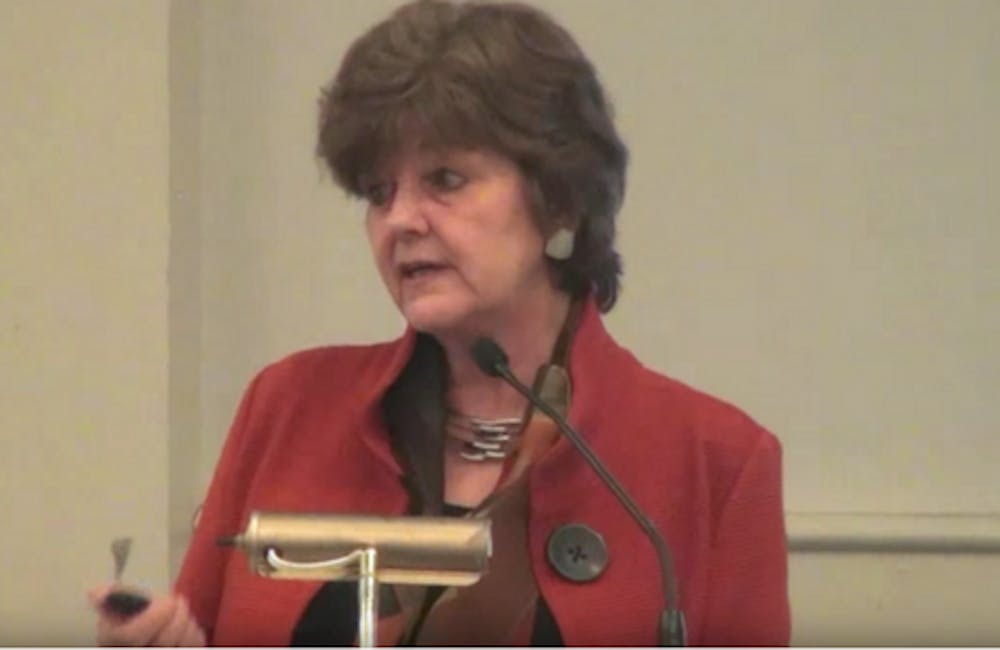Nancy MacLean’s book “Democracy in Chains” has generated controversy, including skepticism from Duke colleagues. After comments she made recently linking an influential libertarian economist to autism, a Duke student created a petition asking the University to condemn her remarks.
Speaking at New York City’s Unitarian Church of All Souls last week about her book, MacLean, William H. Chafe professor of history and public policy, answered an audience member’s question about the motivations of the late economist James Buchanan, whom she considers to be one of the founders of libertarianism. In response, she suggested that Buchanan might have been on the "autism spectrum."
"It's striking to me how many of the architects of this cause seem to be on the autism spectrum,” she said an hour into the talk. “You know, people who don't feel solidarity or empathy with others and who have difficult human relationships sometimes."
She added that Buchanan’s parents had encouraged him to go into politics, but that Buchanan felt he did not have the right personality for that profession. MacLean acknowledged in her answer that her comments were merely speculation.
Her book, published in June 2017, argues that Buchanan offered the intellectual backing to the up-and-coming cause of libertarianism in the mid-20th century. She focuses on Buchanan’s relationship with Charles Koch, arguing that the two paired up to stealthily push the United States into alignment with their libertarian ideals.
Soon after her comments were reported, senior Hunter Michielson, president of Duke Young Americans for Liberty, posted a petition in the All Duke Facebook page asking Duke to punish MacLean for her remarks. It has since been changed to ask Duke to condemn her remarks, instead of punishing her. The petition had 31 signatories as of Wednesday evening.
“We ask that the University issue a statement condemning what she said—it’s an incredibly academically ignorant statement to make,” Michielson told The Chronicle. “It perpetuates horrific stereotypes about people on the autism spectrum. We think it would be very meaningful it the administration would stand up for the libertarian students and autistic students on campus.”
Michael Schoenfeld, vice president for public affairs and government relations, declined to comment on the petition but noted that Duke provides its faculty academic freedom without interference.
Michielson said that he felt there was a double standard, and that there would be more outrage if a conservative processor were to make similar statements regarding liberal scholars or students.
After Michielson posted the petition on Facebook, he drew criticism from students—including those who disagreed with MacLean’s comments—who felt it was wrong to ask Duke to punish a speaker. Reflecting these concerns, Michielson changed the petition to ask Duke only to say the remarks were inappropriate, not otherwise punish her.
Two Duke professors who have criticized MacLean’s book—Georg Vanberg, chair of the political science department, and Michael Munger, professor of political science—also weighed in on the petition.
Vanberg, in addition to taking issue with MacLean’s comments, criticized her response to scholars questioning parts of her book. He wrote in an email that she “prefers to dismiss ideas with pop psychology, or by ascribing sinister motives to individuals.”
Although Munger agreed that the comments were offensive, he added that there is some empirical evidence that libertarians score differently on psychological tests than other groups.
“While the way [Professor] MacLean phrased her answer was clumsy, and the reference to ‘the spectrum’ is something she is neither professionally qualified to judge nor relevant—as well as being offensive—there is good psychological evidence that libertarians are different when it comes to psychological ‘empathy’ scores,” he wrote in an email. “Of course, individuals differ. But to the extent that one can compare the central tendencies of groups, it is true that libertarians as a group have lower empathy scores. That was really the heart of [Professor] MacLean's argument, and she's not wrong about that.”
Junior Riya Dange was one of the students who commented on Michielson’s Facebook post, arguing that more important than the attack on Buchanan was that MacLean seemed to use autism as an insult. She told The Chronicle she was “shocked by how uninformed and offensive [MacLean’s] comment was.”
Dange, a neuroscience major who has done research on autism and whose best friend in high school was diagnosed with autism spectrum disorder, said that such remarks lead people to falsely conflate autism with dangerousness.
“I think MacLean should absolutely apologize—I think there should definitely be a statement from the administration,” she said. “My concern with the petition is how much action will come out of it—it’s a pattern of behavior that we see how people are disrespecting people who have neurological conditions and I think a simple petition isn't enough to solve it. I support it in theory but don't know if this is the most practical solution.”
MacLean did not respond to a request for comment. In a July interview with The Chronicle of Higher Education, MacLean said that one way of viewing early criticism of her work is that the criticism demonstrates the book’s importance.
“This kind of strong reaction can suggest that a work is timely and important and lead more people to want to check it out,” she stated in the 2017 interview.
Claire Ballentine and Bre Bradham contributed reporting.
Get The Chronicle straight to your inbox
Signup for our weekly newsletter. Cancel at any time.

